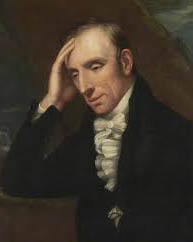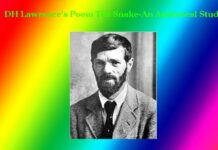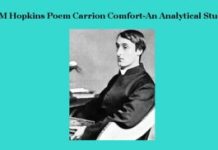Chief Characteristics of Wordsworth’s Poetry
Chief Characteristics of Wordsworth’s Poetry
William Wordsworth is generally called a great Romantic poet who entered into the empire of poetry with his own revolutionized theory and practice. But before saying him to be so, it would be reasonable to bring out the salient characteristics of his poetry.
A close and deeper study of his poems shows us clearly that there are two distinct themes throughout the range of his poems. First, Nature and then Man and besides the two there is nothing else. But his treatment of the two is absolutely his own.
Between the two which is vaster and stronger is Nature. But his treatment of nature is manifold. Throughout his nature poems, he deals with the objects of nature as it is and then he brings out the appeal that the object casts on his mind and senses. Hence his nature poems are sensitive. For example, we can take his poem entitled ‘The Daffodils which is nothing but a plant of flower which dances in the wind. The daffodils which were dancing in the wind, appeal to his mind and woke up the poet’s sense of beauty and joy. But for the poet, the joy and beauty are not temporary but permanent. The poet writes:
”For oft when on my couch I lie
In vacant or in pensive mood,
They flash upon that inward eye
Which is the bliss of solitude;
And then my heart with pleasure fills
And dances with the daffodils.”
In the poem ”Lines written in Early Spring”, the poet says that nature is full of joy and pleasure as:
”And I must think do all I can
That there was pleasure there.”
Besides, Nature being a source of happiness is a shelter for the poet that has the healing and lulling power. He says in a poem:
The silence that is in the starry sky
The sleep that is among the lonely hills.
The second attitude towards nature is that nature is a teacher, a guide, and a nurse for him. He admits this without hesitation in Tintern Abbey.
”In nature and the language of the sense
The anchor of my purest thoughts, the nurse
The guide, the guardian of my heart and soul of all my moral being.”
In the poem ”The Tables Turned” he asks his friend to leave his books and come out in the open field, because he says:
”One impulse from a vernal wood
May teach you more of man,
Of moral evil and of good
Than all the sages can.”
The third attitude towards Nature is that nature is a Divine Power i.e. the expression of God Himself. At this point, it is to say that nature is full of mystery, and mystic note prevails everywhere in nature. Hence his mystic attitude to Nature is what his attitude to God is. ‘The Excursion’ and ‘The Prelude’ illustrate this aspect of Nature. In the poem entitled ‘The Tintern Abbey’ he receives Nature as a Divine Being and says:
”……………………a sense sublime
of something for more deeply interfused
A motion and a spirit that impels
All thinking things all objects of all thoughts
And rolls through all things.”
In ‘The Prelude Book VI’ the poet speaks:
”When the light of the sense
Goes out in flashes that have shown to us
The invisible world.”
Again in another poem he says:
”……………the features
Of the same face, blossoms upon one tree
Characters of the great Apocalypse
The types and symbols of Eternity
Of first and last and midst and without end.”
The second great theme of his poetry after Nature is Man. He thought of man as a part of Nature. But there are some causes that turned his mind to write poems on Man. The first cause is the French Revolution. He welcomed the slogan of the French revolution ‘Fraternity, Equality and Liberty’. But when he saw, later on, that Man had not received his due what he wished to have after the revolution instead he saw many people had lost their lives in Guillotine under the rule of the Terrorists. This sense humanized his soul. The second thing which humanized his heart is the influence of Rousseau who gave emphasis on social equality. Thirdly, when Wordsworth studied Nature then he met some poor and forlorn people, living in contact with nature under very pathetic conditions. A man stands in his poetry as his sympathetic friend; his lover and as the divine spirit. But unlike his nature poems which are the work of fertile sensitiveness, his poems on man are not so. His poetry on man is as he sees them, feels about their poor and afflicted conditions. He sympathizes with them. Moreover, Wordsworth was a poet of nature first so he loved nature most and disliked every sort of artificiality. So in his poetry dealing with man, there is no portrayal of the upper classes. He was, in depicting men in poetry, as Charles Dickens was in his novels. Wordsworth for the first time brings the lower classes of men into the compass of poetry and portrayed their lives, without any artificiality, with greater force. That makes him a poet of humanity. In depicting the poor classes of people he becomes a realist. And so he may be called the first realistic poet of man. Many of his poems dealing with the theme of man read like a modern short stories which are the true representations of the human plight in society. The poems like ‘The Leech Gatherer’, ‘Michael’, ‘Lucy Grey’, and ‘Simon Le’e are read like short stories.
The Poems entitled ‘Three Years He Grew in Sun and Shower’, ‘She was a Phantom of Delights’—are true pictures of real men and women. But the poet only depicts the pathetic states of people. And in doing so, he becomes the poet of the lower classes of people.
The above-quoted passages show that he was a poet of common rustic life. In one of his poems he says:
”……………we brothers all
In honour as in one community
Scholars and gentlemen.” (The Prelude)
The above discussion proves that Wordsworth is a great poet of nature no doubt; but as a poet of man he is greatest as no poet before him portrayed the poor classes of people who struggle with Nature for Survival, and even no poet after him had portrayed the poor plight of people in poetry so lively as was done by Wordsworth.
The mood of expression of his feeling and emotion in poetry is neither humorous nor witty but pathetic and melancholic. Fugitiveness from the bustling life of society is another feature of his poetry.
In dealing with the themes of his poems Wordsworth uses the subjective method. He depicts the object of nature at first, and then he portrays the appeal of the object of nature which his mind and senses receive. In this respect, he is an egoist.
He revolutionized not only the themes, feeling and outlook towards Nature but also the poetic diction. He eschewed all the artificial complexity of poetic diction preceding him and introduced an easy and simple style. His language is simple close to everyday conversation. His language is less figurative and more simple which is characteristically the language of the common people. His diction is characterized by simplicity, clarity, purity and orderliness.
These are the chief characteristics of his poetry.
Now the question is that how far is he a romantic poet? Before going to substantiate this we must know what romanticism is. The Phrase Romanticism comes from the word ‘romance’ which means something fanciful that arouses the sense of excessive wonder, joy, and mystery by means of free imagination which is not possible in real life. So Romanticism is an ‘ism’ of imagination that is fanciful and extravagant and invoke to arouse our sense of wonder, joy, and mystery. In this respect, is a Romantic poet.
There were romantic elements in the poems of poets previous to Wordsworth as in Grey, Crabe and in the poem of William Blake. But Wordsworth perfected it in poetic literature with conscious force and left it in perfection. Being inspired by him, poets succeeding him as Shelly, Keats, Byron and many others practiced the tradition romantic poetry. But among them, Wordsworth is an ideal romantic poet. After him, Keats and Shelly made the culmination of Romantic Tradition in English Literature.
The Romantic Tradition inaugurated officially by William Wordsworth was not confined to poetic literature only but soon it impacted the other branches of literature such as short story, novel, and even the arts and sculpture.
As a founder and practitioner of romantic tradition in literature Wordsworth’s place is after none but is above all. 0 0 0.
Chief Characteristics of Wordsworth’s Poetry
You May Like:
- ‘Poetry is the Criticism of LIfe’ Mathew Arnold-An Explanation
- Contributions of S T Coleridge to the History of Literary Theory and Criticism
Chief Characteristics of Wordsworth’s Poetry
N. B. The article ‘Chief Characteristics of Wordsworth’s Poetry’ originally belongs to the book entitled ‘Critical Essays on English Poetry‘ by Menonim Menonimus.
Chief Characteristics of Wordsworth’s Poetry
Books on Literary Criticism by M. Menonimus:
- World Short Story Criticism
- World Poetry Criticism
- World Drama Criticism
- World Novel Criticism
- World Essay Criticism
- Indian English Poetry Criticism
- Indian English Poets and Poetry Chief Features
- Emily Dickinson’s Poetry-A Thematic Study
- Walt Whitman’s Poetry-A Thematic Study
- Critical Essays on English Poetry
- Tawfiq al-Hakim’s Novel: Return of the Spirit-An Analytical Study
- Tawfiq al-Hakim’s Novel: ‘Yawmiyyat Naib Fil Arayaf’-An Analytical Study
- Analytical Studies of Some Arabic Short Stories
- A Brief History of Arabic Literature: Pre-Islamic Period (500 AD-622 AD)
- A Brief History of Arabic Literature: Early Islamic Period (622 AD-661 AD) …
Related Search:











